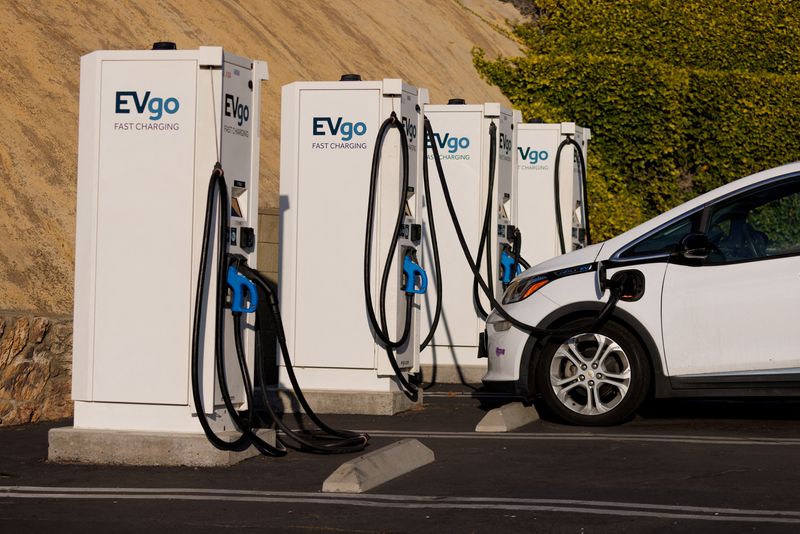By Jarrett Renshaw and Chris Kirkham
(Reuters) – Incoming U.S. President Donald Trump’s transition team is recommending sweeping changes to cut support for electric vehicles and charging stations and strengthen measures blocking cars, parts and battery materials from China, according to a document obtained by Reuters seen.
The recommendations, which have not previously been reported, come at a time when the U.S. transition to electric vehicles is stalling and China’s heavily subsidized EV industry continues to grow, in part because of its superior battery supply chain. During his campaign, Trump pledged to ease regulations on fossil fuel cars and roll back what he called President Joe Biden’s EV mandate.
The transition team also recommends imposing global tariffs on all battery materials, making an effort to boost U.S. production, and then negotiating individual exemptions with allies, the document shows.
Taken together, the recommendations are a stark departure from the Biden administration’s policy, which aimed to balance encouraging a domestic battery supply chain, separate from China, with a rapid EV transition. The transition team plan would redirect the money now flowing to building charging stations and making electric cars affordable to national defense priorities, including securing China-free supplies of batteries and the crucial minerals to build them.
The proposals came from a Trump transition team tasked with crafting a strategy for rapid implementation of new auto policies. The team is also calling for the elimination of the Biden administration’s $7,500 tax credit for the purchase of consumer EVs, a plan first reported by Reuters last month. The policy could deal a blow to U.S. electric vehicle sales and production, at a time when many legacy automakers, including General Motors (NYSE:) and Hyundai (OTC:), have recently rolled out a wider range of electric offerings. have introduced to the American market.
Jason Miller, a senior transition adviser to Trump, said Tuesday that the recommendations come from “outsiders who have no role in shaping administration policy.”
Limiting government support for EVs could also hurt sales of Elon Musk’s Tesla (NASDAQ:), the dominant US EV seller. But Musk, who spent more than a quarter of a billion dollars electing Trump, has said losing subsidies would hurt rivals more than Tesla.
The transition team is calling for the recovery of remaining funds from Biden’s $7.5 billion plan to build charging stations and shift the money to battery mineral processing and the “national defense supply chain and critical infrastructure.”
While batteries, minerals and other EV components “are critical to defense production,” electric vehicles “and charging stations are not,” the document said.
The Defense Department has in recent years highlighted U.S. strategic vulnerabilities due to Chinese dominance in mining and refining crucial minerals, including graphite and lithium needed for batteries, and rare earth metals used in both EV engines as military aircraft.
A 2021 government report said the US military is facing “escalating power needs” for weapons and communications equipment, among other things. “Guaranteed sources of critical minerals and materials” are “critical to U.S. national security,” the report said.
Trump transition spokeswoman Karoline Leavitt said voters have given Trump a mandate to deliver on campaign promises, including ending government attacks on gas-powered cars.
“When he takes office, President Trump will support the auto industry, creating space for both gas and electric vehicles,” Leavitt said in a statement.
CAUSING MORE EXHAUST PIPE CONTAMINATION
Automakers worldwide have switched to electric vehicles in part to meet stricter government limits on climate-damaging exhaust pollution.
But the transition team’s recommendations would allow automakers to produce more gas-powered vehicles by rolling back emissions and fuel economy standards, as championed by the Biden administration. The transition team proposes to return these regulations to 2019 levels, which would allow for an average of approximately 25% more emissions per vehicle kilometer than current limits by 2025 and an average fuel consumption of approximately 15% lower.
The proposal also recommends barring California from setting its own, stricter vehicle emissions standards, which more than a dozen other states have adopted. Trump banned California from imposing stricter requirements during his first term, a policy that Biden reversed.
California has asked the U.S. Environmental Protection Agency for a new waiver to include a stricter set of requirements starting in 2026, eventually requiring all vehicles to be electric, plug-in hybrid or hydrogen-powered by 2035. The Biden administration’s EPA has not approved this. California’s request.
Many of the transition team’s proposals appear aimed at boosting domestic battery production, mainly for defense-related interests. Others appear aimed at protecting automakers, even those that produce electric cars, in the United States.
The proposals include:
– Imposing tariffs on imports of “EV supply chains,” including batteries, critical minerals and charging components. According to the Reuters proposal, the government should use Section 232 tariffs, which target national security threats, to restrict imports of such products.
The Biden administration recently raised tariffs on Chinese imports of a number of products mentioned in the Trump transition document, including lithium-ion batteries, graphite and “permanent magnets” used in EV motors and military applications. These tariffs were issued for economic, not security, reasons.
– Waiving environmental reviews to accelerate “federally funded EV infrastructure projects,” including battery recycling and manufacturing, charging stations and critical mineral production.
– Expanding export restrictions on EV battery technology to hostile countries.
– Provide support for the export of US-made EV batteries through the Export-Import Bank of the United States.
– Using tariffs as a “bargaining tool” to open foreign markets to U.S. auto exports, including electric cars.

– Eliminating federal agency requirements for the purchase of electric vehicles. A Biden policy would require all federal purchases of cars and smaller trucks to be zero-emission vehicles by the end of 2027.
– Termination of DOD programs aimed at acquiring or developing electric military vehicles.
(About Jarrett Renshaw in Philadelphia and Chris Kirkham in Los Angeles, editing by Brian Thevenot and Matthew Lewis (JO:))


